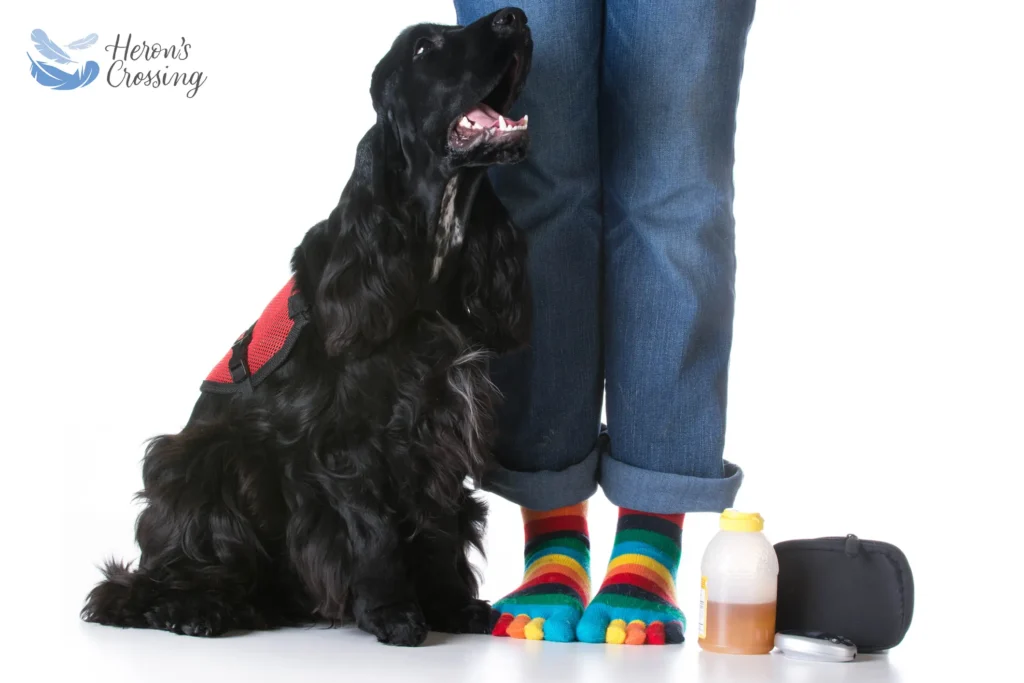As a diabetic, trying to maintain a safe blood sugar level is like trying to stay afloat on a surfboard. It’s a constant balancing act. Too high or too low blood sugar can cause confusion and/or physical inability to react to the crisis in time. And many low blood sugar episodes occur during sleep. This is why people are so grateful for their diabetic alert dogs.
As hunting animals, diabetic alert dogs (DADs) do what they do best – they sniff. Dogs can naturally smell changes in a person’s skin, sweat and breath. Diabetic alert dogs are trained to respond to the smell of glucose and ketones, indicating too high or too low blood sugar levels, and to get help even if their person has passed out or is sleeping.
The best dogs for this job are Labrador or Golden Retrievers and Poodles. But even mixed breed pets who are attuned to their owners and not easily distracted can make good candidates.
Lab and Retriever pups are often specially bred and developed by certified trainers at diabetic alert dog centers. Yet some diabetic alert dogs are home pets who pass a basic training course, and they are just as amazing.
The type of training makes a difference as to whether the dog will be recognized under the Americans with Disabilities Act and some state laws. That could make a difference in getting grant funding for the dog’s expensive training and upkeep. But, for the unsung little heroes who are not born to serve, yet diligently learn and perform their duties, there are support organizations who can help with the costs of training.
One such example is to train a smaller dog who can be carried around in a chest pack, similar to a backpack, to stay close to the face to monitor the breath.
A diabetic alert dog will not only sniff the owner, but look for signs of extreme fatigue, slurring words, difficulty walking, and unusual or seizure behavior. When a low or high blood sugar level is detected, the dog may respond in these ways:
- Signal the owner with a special cue such as touching or licking the person’s nose.
- Alert other family members
- Retrieve the diabetic kit or a specified snack for the owner
- Retrieve the person’s cell phone to call for help
- Use a special device to call 911 for help directly
The dog is rewarded each time she detects a high or low blood sugar situation. Although it’s more difficult to detect a low blood sugar situation because there is less of a scent, the reward should remain the same.
Diabetics do not give up their glucose meters. The dogs work as a backup to regular testing and symptom management. However, in a recent American Diabetes Association poll, 75% of diabetic alert dog owners reported more ability to participate in physical activities and a greater quality of life. The dogs’ vigilance makes it possible for their owners to have a much fuller life without so much worry.
A 2019 study of 27 diabetic alert dogs by the National Institutes of Health found four dogs to be 100% accurate at detecting ‘off’ glycemic levels. The rest were an average of 81% accurate – still very high. The differences in the accuracy of the 81% group seemed to come from how early the dog had been trained, and the ability to maintain a stable routine.
The report speaks of better accuracy during the school year, for example, when there is routine and the dog knows what to expect, and less accuracy during summer when the patient is involved in a variety of activities.
As specialty training for dogs becomes more prevalent, healthline.com warns that there could be imposters, so it’s best to go through your endocrinologist or your vet to locate a legitimate training facility. A verified training school will have accredited trainers, and they will want to make sure that you can afford to properly keep your dog. Good training facilities become like partners, making themselves available for advice, and checking in on the dog from time to time.
Diabetic alert dogs usually work for 10 years before being retired around the age of 12 or 13. Yet many dogs who perform a service don’t want to give up their work. They are devoted to their owners and family.
Likewise, we should cherish and devote special attention to our family dog. You may not know it, but she’s watching you and protecting you.
Heron’s Crossing provides end-of-life care for pets in the Metro Atlanta area. In-home appointments with compassionate vets are available. If you’d prefer a home-like setting away from your home, our Decatur office is also available by appointment.

